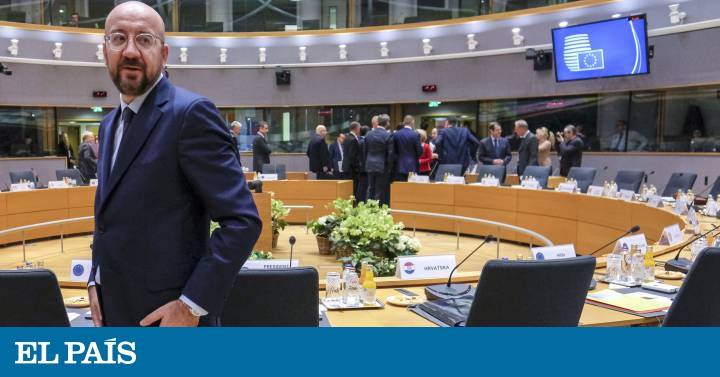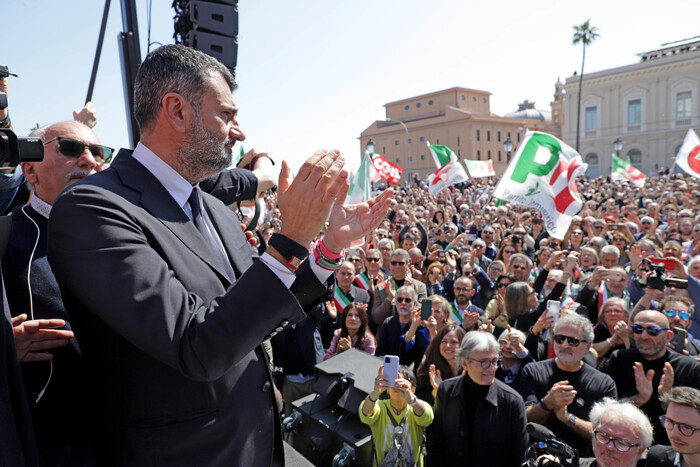MORE INFORMATION
The EU fails in its attempt to agree on the first budgets after Brexit- These ministers are crazy!
- Spain sees the EU budget project unacceptable
Towards division or irrelevance. The petty budgetary battle unleashed at the European summit on Thursday and Friday has jeopardized the coexistence in a community club that had firmly resisted the departure of the United Kingdom on January 31.
The 27 have verified that the vaunted unit against London has broken down as soon as the first economic consequences of Brexit have been faced, which has left a budget hole of 75,000 million euros. And the first summit to agree on the new accounts has not only resulted in a resounding failure. The appointment has also made it clear that, whatever the outcome of the negotiation, the club resigns itself to a waning budget even if it involves condemning the EU to geostrategic irrelevance.
“This negotiation process has damaged the political credibility of the EU,” warns Marta Pilati, an analyst at the EPC study center, specializing in the EU budget, among other things. Pilati believes that the failure of the summit "has shown the lack of unity within the EU even for such a crucial issue as the multiannual budgetary framework." And, in addition, Pilati adds, "the future agreement will probably have a structure that will undermine vital priorities such as research, digital transition, climate change or security."
Diplomatic sources dramatized the predictable fiasco beforehand. "Tradition mandates that there is a failure to take the final step afterwards," a diplomat from one of the countries with the most resources contributed ironically before the meeting.
The president of the Council, Charles Michel, convener of the summit, and the president of the European Commission, Ursula von der Leyen, also relativized the stumbling block shortly after it occurred. "After all, it is only the first time that we have had the opportunity to discuss in detail all the issues within the scope of the European Council," said the President of the Commission.
But beyond the foreseeable lack of agreement, the summit has visualized a disastrous division that anticipates the difficulties that may arise in the coming months and years. The 27 plan to start the second part of the negotiation with London in March, which should fix the future relationship with the United Kingdom. And sources of the European negotiating team recognize that it is a much more delicate phase than the previous one, in which the risk of confrontation between EU partners will be much greater because it will affect their national interests. And the failure of the summit this week is a bad omen
The meeting broke out shortly after starting, when Michel's bilateral meetings with the different delegations on Thursday night highlighted the enormous distance between the demands of each other.
On Friday morning, the Council building was already a field of facing trenches. And the fragmentation of the club left a bad taste in the mouth among many of its participants. "I think it is not a good method for countries to separate into groups and form minorities to block everything," lamented French President Emmanuel Macron at the end of the summit.
The presidents of the Government, including the Spanish Pedro Sánchez, were looking for allies from one delegation to another, joining the race for the Numantine resistance of the different positions. "It seemed that we were in a major school, running from one room to another to meet with the most friends," they describe from one of the delegations.
The seed of the division was sown by the four self-styled frugal countries, which are emerging as heirs of the former role of the United Kingdom as a partner always ready to slam. Holland and Austria, on the one hand, with an increasingly Eurosceptic public opinion. And Sweden and Denmark on the other, with their exceptions to stay out of the euro or the common area of justice and interior.
The four London students made clear from the beginning of the summit their void intention to move from an initial position that aspires to a budget of 1% and discount checks for each of the countries. "I bought an apple to endure the night and Chopin's biography to read a little, what else can be done here?" Said Dutch Prime Minister Mark Rutte upon arrival at the summit.
The anger of the opposite side, in which Spain is, was increasing throughout the day. "We could not let four countries that represent just over 8% of the EU population impose their criteria on blood and fire," they said from the Spanish delegation.
After a first encounter with the so-called 17 Friends of Cohesion, among which are Poland or Hungary, Sanchez also sought contact with the founding countries, with the exception of the Netherlands. "We represent more than 65% of the European population and we want a budget that meets the real needs of citizens," Sánchez tweeted after meeting with the leaders of Germany, France, Italy, Belgium and Luxembourg in a meeting that Greece also attended. and Portugal
But that sum of population is somewhat fictitious, because German Chancellor Angela Merkel and French President Emmanuel Macron were not in the meeting as allies but as potential mediators. Shortly before they had also met with the four frugal, in order to seek ways of agreement. Neither Merkel nor Macron got too involved, however, given their little hurry to reach the pact. Both are much more aware of the delicate political situation they face in their countries, where Merkel faces a possible rebellion in her party and Macron, significant local elections.
The weak Franco-German mediation was joined by the attitude of Michel and Von der Leyen, clearly biased towards a budget containment position. The successive scores never pointed to a budget of 1.11%, which would have been Spain's preferred position, but downwards, with incessant concessions to the frugal (checks, expense reduction, permission to Holland to retain a higher percentage of the tariffs charged on behalf of the EU ...).
In the current period (2014-2020), the EU budget amounts to 1.16% of the Gross National Income of the club discounting the United Kingdom. At the end of Friday's summit, the cuts had already left an equivalent budget proposal on the table slightly below 1.07%. "The EU seems unable to put the money for the policies it proclaims," says Pilati.
And everything indicates that the reduction will increase when Michel summons in the coming weeks or months the second leg of a summit in which all the partners want to win. The lack of generosity of some and the lack of flexibility of others will probably end up losing everyone.











